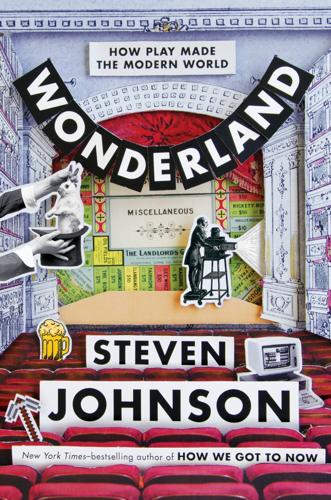
Wonderland: How Play Made the Modern World
by
Steven Johnson
Published 15 Nov 2016
228–31 Jobs, Steve, 220 John of Eschenden, 136 Johnson, Samuel, 14 Jonze, Spike, 184 Kasparov, Gary, 194 Kay, Alan, 217 Kempelen, Wolfgang von, 14 keyboards QWERTY, 86–87 for string instruments, 88–89 to write musical notes, 89 kleptomania, 46–49 Lacassagne, Alexandre, 47–48 Lamarr, Hedy, 98–101, 99 Lancaster, James, 139 Land and Freedom, 196 learning methods, 280–81 leisure time, 11, 259–60 Letters on Natural Magic (Brewster), 155, 157 linear perspective, 160–61 Literary Gazette, 169 Lombroso, Cesare, 47–48 London Magazine, 39 Loth, Vincent, 119 Lovelace, Ada, 82 Macky, John, 258–59 Madinat al-Salam (now Baghdad), 1–3 Maelzel, John Nepomuk, 164–67 magic, natural, 155–56 magic lantern, 150, 152, 168, 171–72, 173 Magie, Lizzie, 195–99 malls in decline because of their predictability, 61 global development of, 53 influence of Victor Gruen, 49–55, 50 as research for Disney’s EPCOT, 56–57 Southdale Center, 49, 51–54, 52 Mandeville, Bernard, 37 Mandeville, John, 26 Manner of Making Coffee, Tea, and Chocolate, The, 126 al-Mansur, Abu Ja’far, 1–3 al-Manum, Abu Ja’far, 3 Marguin, Jean, 77 Mártir d’Angleria, Pedro, 213 Marx, Karl, 10, 14, 153–54 McKendrick, Neil, 37 McLuhan, Marshall, 201 Medici, Ferdinando I de’ (Grand Duke of Tuscany), 83–84 medicine and Black Death, 136–37 compounds made by spicers, 135–36 derived from plants, 133 sexual dysfunction, treatment for, 134 spices as unproven, 136 theriac, 135 vanilla as, 133–34 Méliès, Georges, 171 Merlin, John-Joseph, 6, 7–10 Merlin’s Mechanical Museum, 6, 8–10 Middlemarch (Eliot), 136 Miller, Michael, 42–43 Mills, Abraham, 199–200 Minecraft, 201 Mithridates VI (king), 135 Monopoly Charles Darrow, 198–99 false history of, 198–99 Landlord’s Game, 196–98, 197 Lizzie Magie, 195–99 Parker Brothers, 199 tax reform, as outlined in the Landlord’s Game, 195–96, 197 Mont Blanc, 262–64 Morse, Samuel, 91 movies. See cinema Mumford, Lewis, 50 Murch, Walter, 175 murex snails sea voyages in search of, 18–19 source of Tyrian purple, 17–18, 19 music Ballet Mécanique, 95–98 boxes of the seventeenth and eighteenth centuries, 76 consonance vs. dissonance, 68 cultural invention vs. evolutionary adaptation, 69–72 drawing wave patterns to produce, 103–106 electronic, 101–106 experimental, 95–98 fourths and fifths, 67 intermedi, 83–85 origins of, 67 phonograph, 94–95 physics of intervals, 67–68 Steven Pinker, 70–71 pinned cylinder, 74–77 pursuit of innovation in, 72 Pythagorean tuning, 68 and ratios, 68 recorded, sharing, 106–107 tempo, 96–97 musical instruments bone flutes, 65–70, 66 “Instrument Which Plays by Itself, The,” 73–76, 75 of the Medici intermedi, 84–85 Oramics Machine, 102–106, 105 panharmonicon, 166 pianoforte, 88, 92 player piano, 89, 92–95, 93 natural selection, 269–70 nature as a relaxing escape, 260–66 Nossa Senhora dos Martires (“Pepper Wreck”), 115–16, 117 “novelty bonus” when perceiving new experiences, 281, 282 nutmeg, 113–15, 114, 122–25 Obama, Barack, 33–34 occult shows, 149–50 Oldenburg, Ray, 246 Olmsted, Frederick Law, 274 On Painting (Alberti), 160 On the Economy of Machinery and Manufactures (Babbage), 10 open-ended functionality of machines “Instrument Which Plays by Itself, The,” 75, 75–77 opium trade, 119 optical illusions, 155–56 Brewster Stereoscope, 160 Conflagration of Moscow, The, 164–66 evolutionary adaptations that allow, 174–75 eye as the source of most illusions, 157–58, 159 Kanizsa triangle, 157, 158 Kopfermann cube, 158, 158 linear perspective, 160–61 “Moving Panorama,” 167 Necker cube, 157–58, 158, 159 Panorama paintings, 160–64 persistence of vision, 172, 184 thaumatrope, 172, 174 zoetrope, 172 Oram, Daphne, 102–106, 105 Orlando, Florida, 274 outdoors, the Albert Smith’s Ascent of Mont Blanc (performance), 266 biophilia, 260 celebrated in art, 266 Claude glass, 265, 265–66 fear of wilderness, 260 Mont Blanc, 262–64 mountaineering, 262–64 national parks and wilderness preservation, 266 nature tourism, start of, 264–65 Horace-Bénédict de Saussure, 261, 262–64 Paccard, Michel, 263 panharmonicon, 166 Panorama paintings, 160–64, 162, 266 Parker Brothers, 199 Pascal, Blaise, 207–209 Patrickson, Thomas, 119 pepper biochemistry of, 142–43 Cookbook (Apicus), 118 as currency, 116 Natural History (Pliny the Elder), 118 Nossa Senhora dos Martires (“Pepper Wreck”), 115–16, 117 Queen Elizabeth I’s quest to acquire, 139–41 role in the fall of the Roman Empire, 118 perception, 159–60 Phantasmagoria, the, 150–55, 151 phase transitions, 181–82 Phenomenology of Spirit (Hegel), 151 Philidor, Paul, 149–50 Philipsthal, Paul de, 5, 154 phonograph, 94–95 Pilon, Mary, 195 Pinker, Steven, 70–71 piperine, 142–43 play encourages exploration and innovation, 73, 282 as insight into the future, 15 player piano concept of paying for new programming, 94 difficulties synchronizing more than one, 96–97 early versions, 89 pianola, 92–95, 93 pleasure, seeking, 71–73 “pleasuring grounds,” 274–76 Pliny the Elder, 118, 142 Plumb, J.
…
In a strange way, these virtual companions might be more authentic than the simulated friends of reality TV; at least the robots and virtual humans would acknowledge your existence and engage directly with your shifting emotional states, unlike the Kardashians. The ghost makers and automaton designers of the eighteenth century first tapped the power of illusion to terrify or amuse us; their descendants in the twenty-first century may draw on the same tools to conjure up other feelings: empathy, companionship, even love. 5 Games The Landlord’s Game In the second half of the thirteenth century, a Dominican friar from the Lombard region of modern-day Italy began delivering a series of sermons that meditated on the proper roles of different social groups: royalty and merchants, clergy and farmers. Over the years, his name has been warped into an almost comical number of variations, including Cesolis, Cessole, Cesulis, Cezoli, de Cezolis, de Cossoles.
…
Many progressive thinkers and activists of the period integrated “Georgist” proposals for single-tax plans into their political platforms and stump speeches. But only Lizzie Magie appears to have decided that radical tax reform might make compelling subject matter for a board game. Magie began sketching the outlines of a game she would come to call the Landlord’s Game. In 1904, she published a brief outline of the game in a Georgist journal called Land and Freedom. Her description would be immediately familiar to most grade schoolers in dozens of countries around the world: Representative money, deeds, mortgages, notes and charters are used in the game; lots are bought and sold; rents are collected; money is borrowed (either from the bank or from individuals), and interest and taxes are paid.

Having and Being Had
by
Eula Biss
Published 15 Jan 2020
“Judging wealthy people on the basis of their individual behaviors—do they work hard enough, do they consume reasonably enough, do they give back enough—distracts us from other kinds of questions about the morality of vastly unequal distributions of wealth,” she writes. We shouldn’t ask our rich to be good, in other words, we should ask our economic system to be better. THE LANDLORD’S GAME I’ve been playing Monopoly with J every evening for a week and I haven’t won a single game. J plays with abandon, buys indiscriminately, and wins repeatedly. Tonight he’s thrown a suspicious number of doubles, so I accuse him of cheating. He’s not cheating, he explains to me happily, he’s just a lucky person. The Landlord’s Game, the game that became Monopoly, was designed in the early 1900s to expose the problems with an economic system in which property owners “win” by impoverishing renters.
…
Classification: LCC HD4904.6 .B57 2020 (print) | LCC HD4904.6 (ebook) | DDC 306.3—dc23 LC record available at https://lccn.loc.gov/2020010815 LC ebook record available at https://lccn.loc.gov/2020010816 Cover design: Grace Han Cover art: Detail from the project Income’s Outcome by Danica Phelps pid_prh_5.5.0_c0_r0 for John in love and debt CONTENTS Cover Also by Eula Biss Title Page Copyright Dedication Epigraph Consumption Isn’t It Good? Slumming Commercial Understanding The Right White Not Consumers Living Things Consumers Husbandry The Neighborhood Get Off My Lawn Thanksgiving Capitalism Comforter Affluence Moral Monday The Landlord’s Game Capitalism Pokémon The Piano Art Work Anything Passing Membership Art Poor Rich Work Leisure The Protestant Ethic Work Capitalism Liberation Collection Work Drag The Witch Mother’s Helper Joan Didion Tea Mine Work Art Mastered Work Service Satisfaction Toil Work Play Art The Game Investment Work Bartleby Investment Welcome to the Jungle Maintenance Sin Stocks Integrity Spy vs.
…
The game was informed by the theories of Henry George, who proposed that profits made from a natural resource, like land or coal or oil, should be distributed equally among everyone. No individual, he argued, should build a fortune by laying claim to a collective resource. George believed that everyone was entitled to profit from their labor, but that profits made from the ownership of property should be heavily taxed. The woman who invented the Landlord’s Game, Elizabeth Magie, was an advocate of that tax. As an unmarried woman with her own home, rare at the time, she struggled to support herself on the $10 per week she earned as a stenographer. “If we could be reduced to the character of a machine,” she remarked, “having only to be oiled and kept in working order, $10 perhaps would be sufficient.”

Marx at the Arcade: Consoles, Controllers, and Class Struggle
by
Jamie Woodcock
Published 17 Jun 2019
It turned out not to be what he was looking for, but he did learn something meaningful from the game’s creator, Ralph Anspach: Monopoly had actually been intended “as a critique of the very system it has done so much to promote.”6 Anspach claimed that the real inventor of Monopoly was a Quaker named Elizabeth Magie. The game was invented in 1903 and originally called The Landlord’s Game, featuring tiles named “Lord Blueblood’s Estate” and “The Soakum Lighting Co.” By 1925 the game became known as Monopoly and featured the following text in the introduction: Monopoly is designed to show the evil resulting from the institution of private property. At the start of the game, every player is provided with the same chance of success as every other player.
…
., 147 Jørgensen, Kristine, 122 Joseph, Daniel, 26, 52–53, 123–24 Jung, Carl, 135 K Kasparov, Garry, 29 Kassar, Ray, 152 Kemeny, John, 21–22 Kerr, Aphra, 43 Kickstarter, 32, 45 Kirkpatrick, Graeme, 78 Kotaku, 64–65 Kraft, Philip, 78 Kunkel, Bill, 12 L Labour Party, 145 Lamia, Mark, 119 The Landlord’s Game, 138 The Last of Us, 32 League of Legends, 32, 38, 70, 146, 150–51, 154, 156–57 Leblanc, David, 142 Lebowitz, Michael, 68 Lees, Matt, 155 The Legend of Zelda, 27, 28 Le, Minh, 70 Lemmings, 1 Lind, Maria, 144 London, 4–6, 41, 63, 105, 128, 146 Lumino City, 42 Lunar Lander, 24 M MacLean, Jen, 95–97 Magie, Elizabeth, 138 Magnavox, 22 Mandel, Ernest, 106–7 Manhattan Project, 19, 22 Marine Doom, 54 Mario, 2, 25, 27 Marxism, 3, 8, 12, 67, 159–62 crisis of overproduction and, 26 Eagleton on, 111 labor and, 63 Mandel on, 106–7 on mass culture, 107–8 Ollman and, 137 revolution and, 108 socialism from below and, 132–33 Marx, Karl, 17, 36, 64, 108–10, 139 in Assassin’s Creed Syndicate, 3–8, 63, 66–67, 163 Capital, 8, 53, 67–69, 74 on commodities, 47 materialism of, 129, 133 on ruling ideas, 132 on surplus, 85 MayDay NetParade, 142 May, Theresa, 145 Maze War, 23 McGonigal, Jane, 148 McLuhan, Marshall, 17–18 Medal of Honor, 116 Medal of Honor: Warfighter, 56 Mega Drive / Genesis, 28 Meier, Sid, 129–31, 147 Metal Gear Solid, 2 Microsoft, 30–32, 39, 46 Middle East, 122 Midvale Steel Company, 76 Miles, Desmond, 3–4 Miller, Monica K., 153 Minecraft, 32, 47 MIT, 20–21 Modular One, 24 Molleindustria, 13, 140, 141, 142 Monopoly, 137–38 Monument Valley, 40 Mortal Kombat, 28 Mouse in the Maze, 20 MS-DOS, 1, 105, 106 Muncy, Julie, 117 N Namco, 25 NASA, 42 National Health Service, 42, 145 NATO, 19 Navy SEALs, 56 Nazis, 115 Nearing, Scott, 138 NetEase, 47 New Left, 21 New York, 18, 137, 139 Nexon/Tencent, 38 Ngai, Pun, 73 Niantic, 147 Nicaragua, 119 Nieborg, David, 48, 51 Night in the Wood, 96 Nim, 18, 23 Nimatron, 18 Nintendo, 25–28, 30, 32, 47, 101, 147, 152 Nintendo 64, 28, 32, 115–16 Nintendo Classic Mini Entertainment System, 27 Nintendo Classic Mini Super Nintendo Entertainment System, 28 Nintendo DS, 30 Nintendo Entertainment System, 27 Nintendo Game Boy, 2 North America, 38–39 North, Oliver, 119 Notes from Below, 69, 86, 92, 97, 160 O Oculus Rift, 32 Odyssey, 22 Ollman, Bertell, 137–40 Oregon Trail, The, 22 Origin (EA), 51 Osborne, George, 42 Overwatch, 39 Owen, Wilfred, 117 P Pac-Man, 25 Pajitnov, Alexey, 28 Pakistan, 140 Palestine, 122 Papers, Please, 32, 143 Parkin, Simon, 56 Patterson, Jimmy, 116 Payne, Matthew, 119–20 Pedercini, Paolo, 140, 142 Perfect World Games, 53 de Peuter, Greig, 15–16, 19, 21, 29, 46, 86, 106, 160 Philippines, 41 Phone Story, 140–41 Player Unknown’s Battlegrounds, 38–39 PlayStation, 2, 28, 30, 31, 50, 116, 152 PlayStation 2, 30 PlayStation 3, 30 PlayStation 4, 31, 50 PlayStation Portable, 30 Pokémon GO, 147 Pong, 20, 22 Populous, 31, 127 Prado, Jason, 92 Price, Jessica, 155 Probst, Larry, 83 PS4 Pro, 31 Punch the Trump, 145 Q Quake 2, 70 Quinn, Zoë, 154 R Raytheon, 20–21 Ready at Dawn, 82 Riot Games / Tencent, 38 Roarem Castle, 138 Rockefeller, Nelson, 139 Rockstar, 39, 71 Rockstar North, 40 Rocksteady Studios, 40 Royal Ulster Constabulary, 57 Russell, Steve, 21, 22 Russia, 115, 118–19, 132 Ryse, 86 S SAG-AFTRA, 91, 93, 94, 99 Salen, Katie, 15 Samuel, Arthur, 20 San Francisco, 95 Sarkeesian, Anita, 154 Saving Private Ryan, 116 Scientific American, 22 Screen Actors Guild, 91 Sears Roebuck, 22 Seattle, 91 Second World War, 27, 116–18 Sega, 27, 28, 30 Sega Genesis, 31 Senate, 29 Shannon, Claude, 18–19, 29 Shaw, Carol, 151–52 A Short History of the Gaze, 142 Short, Tanya, 85–86 Silicon Valley, 23, 99 SimCity, 2, 31, 128–29 SimCopter, 2 Sims, The, 31, 127–28 Smilegate/Tencent, 38 Solitaire, 28 Sonic, 2, 27 Sonic the Hedgehog, 28, 97 Sony, 27, 28, 30–32, 39, 46, 82, 152 Sony Online Entertainment, 30 South Armagh Brigade, 57 South Korea, 27 Soviet Union, 19–21, 28 Space Invaders, 24–25 Spacewar!
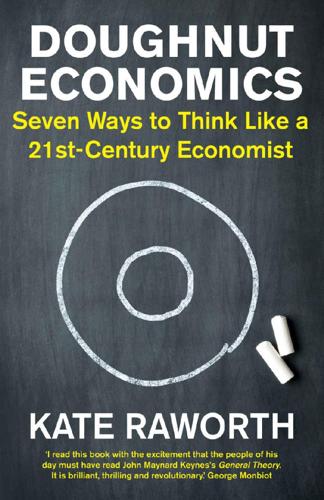
Doughnut Economics: Seven Ways to Think Like a 21st-Century Economist
by
Kate Raworth
Published 22 Mar 2017
Anyone who has played the board game Monopoly is well versed in the dynamics of Success to the Successful: players who are lucky enough to land on expensive properties early in the game can buy them up, build hotels, and reap vast rents from their fellow players, thus accumulating a winning fortune as they bankrupt the rest. Fascinatingly, however, the game was originally called ‘The Landlord’s Game’ and was designed precisely to reveal the injustice arising out of such concentrated property ownership, not to celebrate it. The game’s inventor Elizabeth Magie was an outspoken supporter of Henry George’s ideas and when she first created her game in 1903 she gave it two very different sets of rules to be played in turn.
…
The purpose of the dual sets of rules, said Magie, was for players to experience a ‘practical demonstration of the present system of land grabbing with all its usual outcomes and consequences’ and so understand how different approaches to property ownership can lead to vastly different social outcomes. ‘It might well have been called “The Game of Life”,’ remarked Magie, ‘as it contains all the elements of success and failure in the real world.’ But when the games manufacturer Parker Brothers bought the patent for The Landlord’s Game from Magie in the 1930s, they relaunched it simply as Monopoly, and provided the eager public with just one set of rules: those that celebrate the triumph of one over all.35 Distributional dynamics that play out in board games show up in computer simulations of the economy too. It was Robert Solow, the outspoken critic of modern macro, who ridiculed equilibrium economic models by demonstrating that, far from modelling markets of many players, they were actually made up of a single ‘representative agent’ – reducing the economy to just one typical consumer-worker-owner who responds predictably to ‘external’ shocks.
…
Page numbers in italics denote illustrations A Aalborg, Denmark, 290 Abbott, Anthony ‘Tony’, 31 ABCD group, 148 Abramovitz, Moses, 262 absolute decoupling, 260–61 Acemoglu, Daron, 86 advertising, 58, 106–7, 112, 281 Agbodjinou, Sénamé, 231 agriculture, 5, 46, 72–3, 148, 155, 178, 181, 183 Alaska, 9 Alaska Permanent Fund, 194 Alperovitz, Gar, 177 alternative enterprise designs, 190–91 altruism, 100, 104 Amazon, 192, 196, 276 Amazon rainforest, 105–6, 253 American Economic Association, 3 American Enterprise Institute, 67 American Tobacco Corporation, 107 Andes, 54 animal spirits, 110 Anthropocene epoch, 48, 253 anthropocentrism, 115 Apertuso, 230 Apple, 85, 192 Archer Daniels Midland (ADM), 148 Arendt, Hannah, 115–16 Argentina, 55, 274 Aristotle, 32, 272 Arrow, Kenneth, 134 Articles of Association and Memoranda, 233 Arusha, Tanzania, 202 Asia Wage Floor Alliance, 177 Asian financial crisis (1997), 90 Asknature.org, 232 Athens, 57 austerity, 163 Australia, 31, 103, 177, 180, 211, 224–6, 255, 260 Austria, 263, 274 availability bias, 112 AXIOM, 230 Axtell, Robert, 150 Ayres, Robert, 263 B B Corp, 241 Babylon, 13 Baker, Josephine, 157 balancing feedback loops, 138–41, 155, 271 Ballmer, Steve, 231 Bangla Pesa, 185–6, 293 Bangladesh, 10, 226 Bank for International Settlements, 256 Bank of America, 149 Bank of England, 145, 147, 256 banking, see under finance Barnes, Peter, 201 Barroso, José Manuel, 41 Bartlett, Albert Allen ‘Al’, 247 basic income, 177, 194, 199–201 basic personal values, 107–9 Basle, Switzerland, 80 Bauwens, Michel, 197 Beckerman, Wilfred, 258 Beckham, David, 171 Beech-Nut Packing Company, 107 behavioural economics, 11, 111–14 behavioural psychology, 103, 128 Beinhocker, Eric, 158 Belgium, 236, 252 Bentham, Jeremy, 98 Benyus, Janine, 116, 218, 223–4, 227, 232, 237, 241 Berger, John, 12, 281 Berlin Wall, 141 Bermuda, 277 Bernanke, Ben, 146 Bernays, Edward, 107, 112, 281–3 Bhopal gas disaster (1984), 9 Bible, 19, 114, 151 Big Bang (1986), 87 billionaires, 171, 200, 289 biodiversity, 10, 46, 48–9, 52, 85, 115, 155, 208, 210, 242, 299 as common pool resource, 201 and land conversion, 49 and inequality, 172 and reforesting, 50 biomass, 73, 118, 210, 212, 221 biomimicry, 116, 218, 227, 229 bioplastic, 224, 293 Birmingham, West Midlands, 10 Black, Fischer, 100–101 Blair, Anthony ‘Tony’, 171 Blockchain, 187, 192 blood donation, 104, 118 Body Shop, The, 232–4 Bogotá, Colombia, 119 Bolivia, 54 Boston, Massachusetts, 3 Bowen, Alex, 261 Bowles, Sam, 104 Box, George, 22 Boyce, James, 209 Brasselberg, Jacob, 187 Brazil, 124, 226, 281, 290 bread riots, 89 Brisbane, Australia, 31 Brown, Gordon, 146 Brynjolfsson, Erik, 193, 194, 258 Buddhism, 54 buen vivir, 54 Bullitt Center, Seattle, 217 Bunge, 148 Burkina Faso, 89 Burmark, Lynell, 13 business, 36, 43, 68, 88–9 automation, 191–5, 237, 258, 278 boom and bust, 246 and circular economy, 212, 215–19, 220, 224, 227–30, 232–4, 292 and complementary currencies, 184–5, 292 and core economy, 80 and creative destruction, 142 and feedback loops, 148 and finance, 183, 184 and green growth, 261, 265, 269 and households, 63, 68 living metrics, 241 and market, 68, 88 micro-businesses, 9 and neoliberalism, 67, 87 ownership, 190–91 and political funding, 91–2, 171–2 and taxation, 23, 276–7 workers’ rights, 88, 91, 269 butterfly economy, 220–42 C C–ROADS (Climate Rapid Overview and Decision Support), 153 C40 network, 280 calculating man, 98 California, United States, 213, 224, 293 Cambodia, 254 Cameron, David, 41 Canada, 196, 255, 260, 281, 282 cancer, 124, 159, 196 Capital Institute, 236 carbon emissions, 49–50, 59, 75 and decoupling, 260, 266 and forests, 50, 52 and inequality, 58 reduction of, 184, 201, 213, 216–18, 223–7, 239–41, 260, 266 stock–flow dynamics, 152–4 taxation, 201, 213 Cargill, 148 Carney, Mark, 256 Caterpillar, 228 Catholic Church, 15, 19 Cato Institute, 67 Celts, 54 central banks, 6, 87, 145, 146, 147, 183, 184, 256 Chang, Ha-Joon, 82, 86, 90 Chaplin, Charlie, 157 Chiapas, Mexico, 121–2 Chicago Board Options Exchange (CBOE), 100–101 Chicago School, 34, 99 Chile, 7, 42 China, 1, 7, 48, 154, 289–90 automation, 193 billionaires, 200, 289 greenhouse gas emissions, 153 inequality, 164 Lake Erhai doughnut analysis, 56 open-source design, 196 poverty reduction, 151, 198 renewable energy, 239 tiered pricing, 213 Chinese Development Bank, 239 chrematistics, 32, 273 Christianity, 15, 19, 114, 151 cigarettes, 107, 124 circular economy, 220–42, 257 Circular Flow diagram, 19–20, 28, 62–7, 64, 70, 78, 87, 91, 92, 93, 262 Citigroup, 149 Citizen Reaction Study, 102 civil rights movement, 77 Cleveland, Ohio, 190 climate change, 1, 3, 5, 29, 41, 45–53, 63, 74, 75–6, 91, 141, 144, 201 circular economy, 239, 241–2 dynamics of, 152–5 and G20, 31 and GDP growth, 255, 256, 260, 280 and heuristics, 114 and human rights, 10 and values, 126 climate positive cities, 239 closed systems, 74 coffee, 221 cognitive bias, 112–14 Colander, David, 137 Colombia, 119 common-pool resources, 82–3, 181, 201–2 commons, 69, 82–4, 287 collaborative, 78, 83, 191, 195, 196, 264, 292 cultural, 83 digital, 82, 83, 192, 197, 281 and distribution, 164, 180, 181–2, 205, 267 Embedded Economy, 71, 73, 77–8, 82–4, 85, 92 knowledge, 197, 201–2, 204, 229, 231, 292 commons and money creation, see complementary currencies natural, 82, 83, 180, 181–2, 201, 265 and regeneration, 229, 242, 267, 292 and state, 85, 93, 197, 237 and systems, 160 tragedy of, 28, 62, 69, 82, 181 triumph of, 83 and values, 106, 108 Commons Trusts, 201 complementary currencies, 158, 182–8, 236, 292 complex systems, 28, 129–62 complexity science, 136–7 Consumer Reaction Study, 102 consumerism, 58, 102, 121, 280–84 cooking, 45, 80, 186 Coote, Anna, 278 Copenhagen, Denmark, 124 Copernicus, Nicolaus, 14–15 copyright, 195, 197, 204 core economy, 79–80 Corporate To Do List, 215–19 Costa Rica, 172 Council of Economic Advisers, US, 6, 37 Cox, Jo, 117 cradle to cradle, 224 creative destruction, 142 Cree, 282 Crompton, Tom, 125–6 cross-border flows, 89–90 crowdsourcing, 204 cuckoos, 32, 35, 36, 38, 40, 54, 60, 159, 244, 256, 271 currencies, 182–8, 236, 274, 292 D da Vinci, Leonardo, 13, 94–5 Dallas, Texas, 120 Daly, Herman, 74, 143, 271 Danish Nudging Network, 124 Darwin, Charles, 14 Debreu, Gerard, 134 debt, 37, 146–7, 172–3, 182–5, 247, 255, 269 decoupling, 193, 210, 258–62, 273 defeat device software, 216 deforestation, 49–50, 74, 208, 210 degenerative linear economy, 211–19, 222–3, 237 degrowth, 244 DeMartino, George, 161 democracy, 77, 171–2, 258 demurrage, 274 Denmark, 180, 275, 290 deregulation, 82, 87, 269 derivatives, 100–101, 149 Devas, Charles Stanton, 97 Dey, Suchitra, 178 Diamond, Jared, 154 diarrhoea, 5 differential calculus, 131, 132 digital revolution, 191–2, 264 diversify–select–amplify, 158 double spiral, 54 Doughnut model, 10–11, 11, 23–5, 44, 51 and aspiration, 58–9, 280–84 big picture, 28, 42, 61–93 distribution, 29, 52, 57, 58, 76, 93, 158, 163–205 ecological ceiling, 10, 11, 44, 45, 46, 49, 51, 218, 254, 295, 298 goal, 25–8, 31–60 and governance, 57, 59 growth agnosticism, 29–30, 243–85 human nature, 28–9, 94–128 and population, 57–8 regeneration, 29, 158, 206–42 social foundation, 10, 11, 44, 45, 49, 51, 58, 77, 174, 200, 254, 295–6 systems, 28, 129–62 and technology, 57, 59 Douglas, Margaret, 78–9 Dreyfus, Louis, 148 ‘Dumb and Dumber in Macroeconomics’ (Solow), 135 Durban, South Africa, 214 E Earning by Learning, 120 Earth-system science, 44–53, 115, 216, 288, 298 Easter Island, 154 Easterlin, Richard, 265–6 eBay, 105, 192 eco-literacy, 115 ecological ceiling, 10, 11, 44, 45, 46, 49, 51, 218, 254, 295, 298 Ecological Performance Standards, 241 Econ 101 course, 8, 77 Economics (Lewis), 114 Economics (Samuelson), 19–20, 63–7, 70, 74, 78, 86, 91, 92, 93, 262 Economy for the Common Good, 241 ecosystem services, 7, 116, 269 Ecuador, 54 education, 9, 43, 45, 50–52, 85, 169–70, 176, 200, 249, 279 economic, 8, 11, 18, 22, 24, 36, 287–93 environmental, 115, 239–40 girls’, 57, 124, 178, 198 online, 83, 197, 264, 290 pricing, 118–19 efficient market hypothesis, 28, 62, 68, 87 Egypt, 48, 89 Eisenstein, Charles, 116 electricity, 9, 45, 236, 240 and Bangla Pesa, 186 cars, 231 Ethereum, 187–8 and MONIAC, 75, 262 pricing, 118, 213 see also renewable energy Elizabeth II, Queen of the United Kingdom, 145 Ellen MacArthur Foundation, 220 Embedded Economy, 71–93, 263 business, 88–9 commons, 82–4 Earth, 72–6 economy, 77–8 finance, 86–8 household, 78–81 market, 81–2 power, 91–92 society, 76–7 state, 84–6 trade, 89–90 employment, 36, 37, 51, 142, 176 automation, 191–5, 237, 258, 278 labour ownership, 188–91 workers’ rights, 88, 90, 269 Empty World, 74 Engels, Friedrich, 88 environment and circular economy, 220–42, 257 conservation, 121–2 and degenerative linear economy, 211–19, 222–3 degradation, 5, 9, 10, 29, 44–53, 74, 154, 172, 196, 206–42 education on, 115, 239–40 externalities, 152 fair share, 216–17 and finance, 234–7 generosity, 218–19, 223–7 green growth, 41, 210, 243–85 nudging, 123–5 taxation and quotas, 213–14, 215 zero impact, 217–18, 238, 241 Environmental Dashboard, 240–41 environmental economics, 7, 11, 114–16 Environmental Kuznets Curve, 207–11, 241 environmental space, 54 Epstein, Joshua, 150 equilibrium theory, 134–62 Ethereum, 187–8 ethics, 160–62 Ethiopia, 9, 226, 254 Etsy, 105 Euclid, 13, 15 European Central Bank, 145, 275 European Commission, 41 European Union (EU), 92, 153, 210, 222, 255, 258 Evergreen Cooperatives, 190 Evergreen Direct Investing (EDI), 273 exogenous shocks, 141 exponential growth, 39, 246–85 externalities, 143, 152, 213 Exxon Valdez oil spill (1989), 9 F Facebook, 192 fair share, 216–17 Fama, Eugene, 68, 87 fascism, 234, 277 Federal Reserve, US, 87, 145, 146, 271, 282 feedback loops, 138–41, 143, 148, 155, 250, 271 feminist economics, 11, 78–81, 160 Ferguson, Thomas, 91–2 finance animal spirits, 110 bank runs, 139 Black–Scholes model, 100–101 boom and bust, 28–9, 110, 144–7 and Circular Flow, 63–4, 87 and complex systems, 134, 138, 139, 140, 141, 145–7 cross-border flows, 89 deregulation, 87 derivatives, 100–101, 149 and distribution, 169, 170, 173, 182–4, 198–9, 201 and efficient market hypothesis, 63, 68 and Embedded Economy, 71, 86–8 and financial-instability hypothesis, 87, 146 and GDP growth, 38 and media, 7–8 mobile banking, 199–200 and money creation, 87, 182–5 and regeneration, 227, 229, 234–7 in service to life, 159, 234–7 stakeholder finance, 190 and sustainability, 216, 235–6, 239 financial crisis (2008), 1–4, 5, 40, 63, 86, 141, 144, 278, 290 and efficient market hypothesis, 87 and equilibrium theory, 134, 145 and financial-instability hypothesis, 87 and inequality, 90, 170, 172, 175 and money creation, 182 and worker’s rights, 278 financial flows, 89 Financial Times, 183, 266, 289 financial-instability hypothesis, 87, 146 First Green Bank, 236 First World War (1914–18), 166, 170 Fisher, Irving, 183 fluid values, 102, 106–9 food, 3, 43, 45, 50, 54, 58, 59, 89, 198 food banks, 165 food price crisis (2007–8), 89, 90, 180 Ford, 277–8 foreign direct investment, 89 forest conservation, 121–2 fossil fuels, 59, 73, 75, 92, 212, 260, 263 Foundations of Economic Analysis (Samuelson), 17–18 Foxconn, 193 framing, 22–3 France, 43, 165, 196, 238, 254, 256, 281, 290 Frank, Robert, 100 free market, 33, 37, 67, 68, 70, 81–2, 86, 90 free open-source hardware (FOSH), 196–7 free open-source software (FOSS), 196 free trade, 70, 90 Freeman, Ralph, 18–19 freshwater cycle, 48–9 Freud, Sigmund, 107, 281 Friedman, Benjamin, 258 Friedman, Milton, 34, 62, 66–9, 84–5, 88, 99, 183, 232 Friends of the Earth, 54 Full World, 75 Fuller, Buckminster, 4 Fullerton, John, 234–6, 273 G G20, 31, 56, 276, 279–80 G77, 55 Gal, Orit, 141 Gandhi, Mohandas, 42, 293 Gangnam Style, 145 Gardens of Democracy, The (Liu & Hanauer), 158 gender equality, 45, 51–2, 57, 78–9, 85, 88, 118–19, 124, 171, 198 generosity, 218–19, 223–9 geometry, 13, 15 George, Henry, 149, 179 Georgescu-Roegen, Nicholas, 252 geothermal energy, 221 Gerhardt, Sue, 283 Germany, 2, 41, 100, 118, 165, 189, 211, 213, 254, 256, 260, 274 Gessel, Silvio, 274 Ghent, Belgium, 236 Gift Relationship, The (Titmuss), 118–19 Gigerenzer, Gerd, 112–14 Gintis, Herb, 104 GiveDirectly, 200 Glass–Steagall Act (1933), 87 Glennon, Roger, 214 Global Alliance for Tax Justice, 277 global material footprints, 210–11 Global Village Construction Set, 196 globalisation, 89 Goerner, Sally, 175–6 Goffmann, Erving, 22 Going for Growth, 255 golden rule, 91 Goldman Sachs, 149, 170 Gómez-Baggethun, Erik, 122 Goodall, Chris, 211 Goodwin, Neva, 79 Goody, Jade, 124 Google, 192 Gore, Albert ‘Al’, 172 Gorgons, 244, 256, 257, 266 graffiti, 15, 25, 287 Great Acceleration, 46, 253–4 Great Depression (1929–39), 37, 70, 170, 173, 183, 275, 277, 278 Great Moderation, 146 Greece, Ancient, 4, 13, 32, 48, 54, 56–7, 160, 244 green growth, 41, 210, 243–85 Greenham, Tony, 185 greenhouse gas emissions, 31, 46, 50, 75–6, 141, 152–4 and decoupling, 260, 266 and Environmental Kuznets Curve, 208, 210 and forests, 50, 52 and G20, 31 and inequality, 58 reduction of, 184, 201–2, 213, 216–18, 223–7, 239–41, 256, 259–60, 266, 298 stock–flow dynamics, 152–4 and taxation, 201, 213 Greenland, 141, 154 Greenpeace, 9 Greenspan, Alan, 87 Greenwich, London, 290 Grenoble, France, 281 Griffiths, Brian, 170 gross domestic product (GDP), 25, 31–2, 35–43, 57, 60, 84, 164 as cuckoo, 32, 35, 36, 38, 40, 54, 60, 159, 244, 256, 271 and Environmental Kuznets Curve, 207–11 and exponential growth, 39, 53, 246–85 and growth agnosticism, 29–30, 240, 243–85 and inequality, 173 and Kuznets Curve, 167, 173, 188–9 gross national product (GNP), 36–40 Gross World Product, 248 Grossman, Gene, 207–8, 210 ‘grow now, clean up later’, 207 Guatemala, 196 H Haifa, Israel, 120 Haldane, Andrew, 146 Han Dynasty, 154 Hanauer, Nick, 158 Hansen, Pelle, 124 Happy Planet Index, 280 Hardin, Garrett, 69, 83, 181 Harvard University, 2, 271, 290 von Hayek, Friedrich, 7–8, 62, 66, 67, 143, 156, 158 healthcare, 43, 50, 57, 85, 123, 125, 170, 176, 200, 269, 279 Heilbroner, Robert, 53 Henry VIII, King of England and Ireland, 180 Hepburn, Cameron, 261 Herbert Simon, 111 heuristics, 113–14, 118, 123 high-income countries growth, 30, 244–5, 254–72, 282 inequality, 165, 168, 169, 171 labour, 177, 188–9, 278 overseas development assistance (ODA), 198–9 resource intensive lifestyles, 46, 210–11 trade, 90 Hippocrates, 160 History of Economic Analysis (Schumpeter), 21 HIV/AIDS, 123 Holocene epoch, 46–8, 75, 115, 253 Homo economicus, 94–103, 109, 127–8 Homo sapiens, 38, 104, 130 Hong Kong, 180 household, 78 housing, 45, 59, 176, 182–3, 269 Howe, Geoffrey, 67 Hudson, Michael, 183 Human Development Index, 9, 279 human nature, 28 human rights, 10, 25, 45, 49, 50, 95, 214, 233 humanistic economics, 42 hydropower, 118, 260, 263 I Illinois, United States, 179–80 Imago Mundi, 13 immigration, 82, 199, 236, 266 In Defense of Economic Growth (Beckerman), 258 Inclusive Wealth Index, 280 income, 51, 79–80, 82, 88, 176–8, 188–91, 194, 199–201 India, 2, 9, 10, 42, 124, 164, 178, 196, 206–7, 242, 290 Indonesia, 90, 105–6, 164, 168, 200 Indus Valley civilisation, 48 inequality, 1, 5, 25, 41, 63, 81, 88, 91, 148–52, 209 and consumerism, 111 and democracy, 171 and digital revolution, 191–5 and distribution, 163–205 and environmental degradation, 172 and GDP growth, 173 and greenhouse gas emissions, 58 and intellectual property, 195–8 and Kuznets Curve, 29, 166–70, 173–4 and labour ownership, 188–91 and land ownership, 178–82 and money creation, 182–8 and social welfare, 171 Success to the Successful, 148, 149, 151, 166 inflation, 36, 248, 256, 275 insect pollination services, 7 Institute of Economic Affairs, 67 institutional economics, 11 intellectual property rights, 195–8, 204 interest, 36, 177, 182, 184, 275–6 Intergovernmental Panel on Climate Change, 25 International Monetary Fund (IMF), 170, 172, 173, 183, 255, 258, 271 Internet, 83–4, 89, 105, 192, 202, 264 Ireland, 277 Iroquois Onondaga Nation, 116 Israel, 100, 103, 120 Italy, 165, 196, 254 J Jackson, Tim, 58 Jakubowski, Marcin, 196 Jalisco, Mexico, 217 Japan, 168, 180, 211, 222, 254, 256, 263, 275 Jevons, William Stanley, 16, 97–8, 131, 132, 137, 142 John Lewis Partnership, 190 Johnson, Lyndon Baines, 37 Johnson, Mark, 38 Johnson, Todd, 191 JPMorgan Chase, 149, 234 K Kahneman, Daniel, 111 Kamkwamba, William, 202, 204 Kasser, Tim, 125–6 Keen, Steve, 146, 147 Kelly, Marjorie, 190–91, 233 Kennedy, John Fitzgerald, 37, 250 Kennedy, Paul, 279 Kenya, 118, 123, 180, 185–6, 199–200, 226, 292 Keynes, John Maynard, 7–8, 22, 66, 69, 134, 184, 251, 277–8, 284, 288 Kick It Over movement, 3, 289 Kingston, London, 290 Knight, Frank, 66, 99 knowledge commons, 202–4, 229, 292 Kokstad, South Africa, 56 Kondratieff waves, 246 Korzybski, Alfred, 22 Krueger, Alan, 207–8, 210 Kuhn, Thomas, 22 Kumhof, Michael, 172 Kuwait, 255 Kuznets, Simon, 29, 36, 39–40, 166–70, 173, 174, 175, 204, 207 KwaZulu Natal, South Africa, 56 L labour ownership, 188–91 Lake Erhai, Yunnan, 56 Lakoff, George, 23, 38, 276 Lamelara, Indonesia, 105–6 land conversion, 49, 52, 299 land ownership, 178–82 land-value tax, 73, 149, 180 Landesa, 178 Landlord’s Game, The, 149 law of demand, 16 laws of motion, 13, 16–17, 34, 129, 131 Lehman Brothers, 141 Leopold, Aldo, 115 Lesotho, 118, 199 leverage points, 159 Lewis, Fay, 178 Lewis, Justin, 102 Lewis, William Arthur, 114, 167 Lietaer, Bernard, 175, 236 Limits to Growth, 40, 154, 258 Linux, 231 Liu, Eric, 158 living metrics, 240–42 living purpose, 233–4 Lomé, Togo, 231 London School of Economics (LSE), 2, 34, 65, 290 London Underground, 12 loss aversion, 112 low-income countries, 90, 164–5, 168, 173, 180, 199, 201, 209, 226, 254, 259 Lucas, Robert, 171 Lula da Silva, Luiz Inácio, 124 Luxembourg, 277 Lyle, John Tillman, 214 Lyons, Oren, 116 M M–PESA, 199–200 MacDonald, Tim, 273 Machiguenga, 105–6 MacKenzie, Donald, 101 macroeconomics, 36, 62–6, 76, 80, 134–5, 145, 147, 150, 244, 280 Magie, Elizabeth, 149, 153 Malala effect, 124 malaria, 5 Malawi, 118, 202, 204 Malaysia, 168 Mali, Taylor, 243 Malthus, Thomas, 252 Mamsera Rural Cooperative, 190 Manhattan, New York, 9, 41 Mani, Muthukumara, 206 Manitoba, 282 Mankiw, Gregory, 2, 34 Mannheim, Karl, 22 Maoris, 54 market, 81–2 and business, 88 circular flow, 64 and commons, 83, 93, 181, 200–201 efficiency of, 28, 62, 68, 87, 148, 181 and equilibrium theory, 131–5, 137, 143–7, 155, 156 free market, 33, 37, 67–70, 90, 208 and households, 63, 69, 78, 79 and maxi-max rule, 161 and pricing, 117–23, 131, 160 and rational economic man, 96, 100–101, 103, 104 and reciprocity, 105, 106 reflexivity of, 144–7 and society, 69–70 and state, 84–6, 200, 281 Marshall, Alfred, 17, 98, 133, 165, 253, 282 Marx, Karl, 88, 142, 165, 272 Massachusetts Institute of Technology (MIT), 17–20, 152–5 massive open online courses (MOOCs), 290 Matthew Effect, 151 Max-Neef, Manfred, 42 maxi-max rule, 161 maximum wage, 177 Maya civilisation, 48, 154 Mazzucato, Mariana, 85, 195, 238 McAfee, Andrew, 194, 258 McDonough, William, 217 Meadows, Donella, 40, 141, 159, 271, 292 Medusa, 244, 257, 266 Merkel, Angela, 41 Messerli, Elspeth, 187 Metaphors We Live By (Lakoff & Johnson), 38 Mexico, 121–2, 217 Michaels, Flora S., 6 micro-businesses, 9, 173, 178 microeconomics, 132–4 microgrids, 187–8 Micronesia, 153 Microsoft, 231 middle class, 6, 46, 58 middle-income countries, 90, 164, 168, 173, 180, 226, 254 migration, 82, 89–90, 166, 195, 199, 236, 266, 286 Milanovic, Branko, 171 Mill, John Stuart, 33–4, 73, 97, 250, 251, 283, 284, 288 Millo, Yuval, 101 minimum wage, 82, 88, 176 Minsky, Hyman, 87, 146 Mises, Ludwig von, 66 mission zero, 217 mobile banking, 199–200 mobile phones, 222 Model T revolution, 277–8 Moldova, 199 Mombasa, Kenya, 185–6 Mona Lisa (da Vinci), 94 money creation, 87, 164, 177, 182–8, 205 MONIAC (Monetary National Income Analogue Computer), 64–5, 75, 142, 262 Monoculture (Michaels), 6 Monopoly, 149 Mont Pelerin Society, 67, 93 Moral Consequences of Economic Growth, The (Friedman), 258 moral vacancy, 41 Morgan, Mary, 99 Morogoro, Tanzania, 121 Moyo, Dambisa, 258 Muirhead, Sam, 230, 231 MultiCapital Scorecard, 241 Murphy, David, 264 Murphy, Richard, 185 musical tastes, 110 Myriad Genetics, 196 N national basic income, 177 Native Americans, 115, 116, 282 natural capital, 7, 116, 269 Natural Economic Order, The (Gessel), 274 Nedbank, 216 negative externalities, 213 negative interest rates, 275–6 neoclassical economics, 134, 135 neoliberalism, 7, 62–3, 67–70, 81, 83, 84, 88, 93, 143, 170, 176 Nepal, 181, 199 Nestlé, 217 Netherlands, 211, 235, 224, 226, 238, 277 networks, 110–11, 117, 118, 123, 124–6, 174–6 neuroscience, 12–13 New Deal, 37 New Economics Foundation, 278, 283 New Year’s Day, 124 New York, United States, 9, 41, 55 Newlight Technologies, 224, 226, 293 Newton, Isaac, 13, 15–17, 32–3, 95, 97, 129, 131, 135–7, 142, 145, 162 Nicaragua, 196 Nigeria, 164 nitrogen, 49, 52, 212–13, 216, 218, 221, 226, 298 ‘no pain, no gain’, 163, 167, 173, 204, 209 Nobel Prize, 6–7, 43, 83, 101, 167 Norway, 281 nudging, 112, 113, 114, 123–6 O Obama, Barack, 41, 92 Oberlin, Ohio, 239, 240–41 Occupy movement, 40, 91 ocean acidification, 45, 46, 52, 155, 242, 298 Ohio, United States, 190, 239 Okun, Arthur, 37 onwards and upwards, 53 Open Building Institute, 196 Open Source Circular Economy (OSCE), 229–32 open systems, 74 open-source design, 158, 196–8, 265 open-source licensing, 204 Organisation for Economic Co-operation and Development (OECD), 38, 210, 255–6, 258 Origin of Species, The (Darwin), 14 Ormerod, Paul, 110, 111 Orr, David, 239 Ostrom, Elinor, 83, 84, 158, 160, 181–2 Ostry, Jonathan, 173 OSVehicle, 231 overseas development assistance (ODA), 198–200 ownership of wealth, 177–82 Oxfam, 9, 44 Oxford University, 1, 36 ozone layer, 9, 50, 115 P Pachamama, 54, 55 Pakistan, 124 Pareto, Vilfredo, 165–6, 175 Paris, France, 290 Park 20|20, Netherlands, 224, 226 Parker Brothers, 149 Patagonia, 56 patents, 195–6, 197, 204 patient capital, 235 Paypal, 192 Pearce, Joshua, 197, 203–4 peer-to-peer networks, 187, 192, 198, 203, 292 People’s QE, 184–5 Perseus, 244 Persia, 13 Peru, 2, 105–6 Phillips, Adam, 283 Phillips, William ‘Bill’, 64–6, 75, 142, 262 phosphorus, 49, 52, 212–13, 218, 298 Physiocrats, 73 Pickett, Kate, 171 pictures, 12–25 Piketty, Thomas, 169 Playfair, William, 16 Poincaré, Henri, 109, 127–8 Polanyi, Karl, 82, 272 political economy, 33–4, 42 political funding, 91–2, 171–2 political voice, 43, 45, 51–2, 77, 117 pollution, 29, 45, 52, 85, 143, 155, 206–17, 226, 238, 242, 254, 298 population, 5, 46, 57, 155, 199, 250, 252, 254 Portugal, 211 post-growth society, 250 poverty, 5, 9, 37, 41, 50, 88, 118, 148, 151 emotional, 283 and inequality, 164–5, 168–9, 178 and overseas development assistance (ODA), 198–200 and taxation, 277 power, 91–92 pre-analytic vision, 21–2 prescription medicines, 123 price-takers, 132 prices, 81, 118–23, 131, 160 Principles of Economics (Mankiw), 34 Principles of Economics (Marshall), 17, 98 Principles of Political Economy (Mill), 288 ProComposto, 226 Propaganda (Bernays), 107 public relations, 107, 281 public spending v. investment, 276 public–private patents, 195 Putnam, Robert, 76–7 Q quantitative easing (QE), 184–5 Quebec, 281 Quesnay, François, 16, 73 R Rabot, Ghent, 236 Rancière, Romain, 172 rating and review systems, 105 rational economic man, 94–103, 109, 111, 112, 126, 282 Reagan, Ronald, 67 reciprocity, 103–6, 117, 118, 123 reflexivity of markets, 144 reinforcing feedback loops, 138–41, 148, 250, 271 relative decoupling, 259 renewable energy biomass energy, 118, 221 and circular economy, 221, 224, 226, 235, 238–9, 274 and commons, 83, 85, 185, 187–8, 192, 203, 264 geothermal energy, 221 and green growth, 257, 260, 263, 264, 267 hydropower, 118, 260, 263 pricing, 118 solar energy, see solar energy wave energy, 221 wind energy, 75, 118, 196, 202–3, 221, 233, 239, 260, 263 rentier sector, 180, 183, 184 reregulation, 82, 87, 269 resource flows, 175 resource-intensive lifestyles, 46 Rethinking Economics, 289 Reynebeau, Guy, 237 Ricardo, David, 67, 68, 73, 89, 250 Richardson, Katherine, 53 Rifkin, Jeremy, 83, 264–5 Rise and Fall of the Great Powers, The (Kennedy), 279 risk, 112, 113–14 Robbins, Lionel, 34 Robinson, James, 86 Robinson, Joan, 142 robots, 191–5, 237, 258, 278 Rockefeller Foundation, 135 Rockford, Illinois, 179–80 Rockström, Johan, 48, 55 Roddick, Anita, 232–4 Rogoff, Kenneth, 271, 280 Roman Catholic Church, 15, 19 Rombo, Tanzania, 190 Rome, Ancient, 13, 48, 154 Romney, Mitt, 92 Roosevelt, Franklin Delano, 37 rooted membership, 190 Rostow, Walt, 248–50, 254, 257, 267–70, 284 Ruddick, Will, 185 rule of thumb, 113–14 Ruskin, John, 42, 223 Russia, 200 rust belt, 90, 239 S S curve, 251–6 Sainsbury’s, 56 Samuelson, Paul, 17–21, 24–5, 38, 62–7, 70, 74, 84, 91, 92, 93, 262, 290–91 Sandel, Michael, 41, 120–21 Sanergy, 226 sanitation, 5, 51, 59 Santa Fe, California, 213 Santinagar, West Bengal, 178 São Paolo, Brazil, 281 Sarkozy, Nicolas, 43 Saumweder, Philipp, 226 Scharmer, Otto, 115 Scholes, Myron, 100–101 Schumacher, Ernst Friedrich, 42, 142 Schumpeter, Joseph, 21 Schwartz, Shalom, 107–9 Schwarzenegger, Arnold, 163, 167, 204 ‘Science and Complexity’ (Weaver), 136 Scotland, 57 Seaman, David, 187 Seattle, Washington, 217 second machine age, 258 Second World War (1939–45), 18, 37, 70, 170 secular stagnation, 256 self-interest, 28, 68, 96–7, 99–100, 102–3 Selfish Society, The (Gerhardt), 283 Sen, Amartya, 43 Shakespeare, William, 61–3, 67, 93 shale gas, 264, 269 Shang Dynasty, 48 shareholders, 82, 88, 189, 191, 227, 234, 273, 292 sharing economy, 264 Sheraton Hotel, Boston, 3 Siegen, Germany, 290 Silicon Valley, 231 Simon, Julian, 70 Sinclair, Upton, 255 Sismondi, Jean, 42 slavery, 33, 77, 161 Slovenia, 177 Small Is Beautiful (Schumacher), 42 smart phones, 85 Smith, Adam, 33, 57, 67, 68, 73, 78–9, 81, 96–7, 103–4, 128, 133, 160, 181, 250 social capital, 76–7, 122, 125, 172 social contract, 120, 125 social foundation, 10, 11, 44, 45, 49, 51, 58, 77, 174, 200, 254, 295–6 social media, 83, 281 Social Progress Index, 280 social pyramid, 166 society, 76–7 solar energy, 59, 75, 111, 118, 187–8, 190 circular economy, 221, 222, 223, 224, 226–7, 239 commons, 203 zero-energy buildings, 217 zero-marginal-cost revolution, 84 Solow, Robert, 135, 150, 262–3 Soros, George, 144 South Africa, 56, 177, 214, 216 South Korea, 90, 168 South Sea Bubble (1720), 145 Soviet Union (1922–91), 37, 67, 161, 279 Spain, 211, 238, 256 Spirit Level, The (Wilkinson & Pickett), 171 Sraffa, Piero, 148 St Gallen, Switzerland, 186 Stages of Economic Growth, The (Rostow), 248–50, 254 stakeholder finance, 190 Standish, Russell, 147 state, 28, 33, 69–70, 78, 82, 160, 176, 180, 182–4, 188 and commons, 85, 93, 197, 237 and market, 84–6, 200, 281 partner state, 197, 237–9 and robots, 195 stationary state, 250 Steffen, Will, 46, 48 Sterman, John, 66, 143, 152–4 Steuart, James, 33 Stiglitz, Joseph, 43, 111, 196 stocks and flows, 138–41, 143, 144, 152 sub-prime mortgages, 141 Success to the Successful, 148, 149, 151, 166 Sugarscape, 150–51 Summers, Larry, 256 Sumner, Andy, 165 Sundrop Farms, 224–6 Sunstein, Cass, 112 supply and demand, 28, 132–6, 143, 253 supply chains, 10 Sweden, 6, 255, 275, 281 swishing, 264 Switzerland, 42, 66, 80, 131, 186–7, 275 T Tableau économique (Quesnay), 16 tabula rasa, 20, 25, 63, 291 takarangi, 54 Tanzania, 121, 190, 202 tar sands, 264, 269 taxation, 78, 111, 165, 170, 176, 177, 237–8, 276–9 annual wealth tax, 200 environment, 213–14, 215 global carbon tax, 201 global financial transactions tax, 201, 235 land-value tax, 73, 149, 180 non-renewable resources, 193, 237–8, 278–9 People’s QE, 185 tax relief v. tax justice, 23, 276–7 TED (Technology, Entertainment, Design), 202, 258 Tempest, The (Shakespeare), 61, 63, 93 Texas, United States, 120 Thailand, 90, 200 Thaler, Richard, 112 Thatcher, Margaret, 67, 69, 76 Theory of Moral Sentiments (Smith), 96 Thompson, Edward Palmer, 180 3D printing, 83–4, 192, 198, 231, 264 thriving-in-balance, 54–7, 62 tiered pricing, 213–14 Tigray, Ethiopia, 226 time banking, 186 Titmuss, Richard, 118–19 Toffler, Alvin, 12, 80 Togo, 231, 292 Torekes, 236–7 Torras, Mariano, 209 Torvalds, Linus, 231 trade, 62, 68–9, 70, 89–90 trade unions, 82, 176, 189 trademarks, 195, 204 Transatlantic Trade and Investment Partnership (TTIP), 92 transport, 59 trickle-down economics, 111, 170 Triodos, 235 Turkey, 200 Tversky, Amos, 111 Twain, Mark, 178–9 U Uganda, 118, 125 Ulanowicz, Robert, 175 Ultimatum Game, 105, 117 unemployment, 36, 37, 276, 277–9 United Kingdom Big Bang (1986), 87 blood donation, 118 carbon dioxide emissions, 260 free trade, 90 global material footprints, 211 money creation, 182 MONIAC (Monetary National Income Analogue Computer), 64–5, 75, 142, 262 New Economics Foundation, 278, 283 poverty, 165, 166 prescription medicines, 123 wages, 188 United Nations, 55, 198, 204, 255, 258, 279 G77 bloc, 55 Human Development Index, 9, 279 Sustainable Development Goals, 24, 45 United States American Economic Association meeting (2015), 3 blood donation, 118 carbon dioxide emissions, 260 Congress, 36 Council of Economic Advisers, 6, 37 Earning by Learning, 120 Econ 101 course, 8, 77 Exxon Valdez oil spill (1989), 9 Federal Reserve, 87, 145, 146, 271, 282 free trade, 90 Glass–Steagall Act (1933), 87 greenhouse gas emissions, 153 global material footprint, 211 gross national product (GNP), 36–40 inequality, 170, 171 land-value tax, 73, 149, 180 political funding, 91–2, 171 poverty, 165, 166 productivity and employment, 193 rust belt, 90, 239 Transatlantic Trade and Investment Partnership (TTIP), 92 wages, 188 universal basic income, 200 University of Berkeley, 116 University of Denver, 160 urbanisation, 58–9 utility, 35, 98, 133 V values, 6, 23, 34, 35, 42, 117, 118, 121, 123–6 altruism, 100, 104 anthropocentric, 115 extrinsic, 115 fluid, 28, 102, 106–9 and networks, 110–11, 117, 118, 123, 124–6 and nudging, 112, 113, 114, 123–6 and pricing, 81, 120–23 Veblen, Thorstein, 82, 109, 111, 142 Venice, 195 verbal framing, 23 Verhulst, Pierre, 252 Victor, Peter, 270 Viner, Jacob, 34 virtuous cycles, 138, 148 visual framing, 23 Vitruvian Man, 13–14 Volkswagen, 215–16 W Wacharia, John, 186 Wall Street, 149, 234, 273 Wallich, Henry, 282 Walras, Léon, 131, 132, 133–4, 137 Ward, Barbara, 53 Warr, Benjamin, 263 water, 5, 9, 45, 46, 51, 54, 59, 79, 213–14 wave energy, 221 Ways of Seeing (Berger), 12, 281 Wealth of Nations, The (Smith), 74, 78, 96, 104 wealth ownership, 177–82 Weaver, Warren, 135–6 weightless economy, 261–2 WEIRD (Western, educated, industrialised, rich, democratic), 103–5, 110, 112, 115, 117, 282 West Bengal, India, 124, 178 West, Darrell, 171–2 wetlands, 7 whale hunting, 106 Wiedmann, Tommy, 210 Wikipedia, 82, 223 Wilkinson, Richard, 171 win–win trade, 62, 68, 89 wind energy, 75, 118, 196, 202–3, 221, 233, 239, 260, 263 Wizard of Oz, The, 241 Woelab, 231, 293 Wolf, Martin, 183, 266 women’s rights, 33, 57, 107, 160, 201 and core economy, 69, 79–81 education, 57, 124, 178, 198 and land ownership, 178 see also gender equality workers’ rights, 88, 91, 269 World 3 model, 154–5 World Bank, 6, 41, 119, 164, 168, 171, 206, 255, 258 World No Tobacco Day, 124 World Trade Organization, 6, 89 worldview, 22, 54, 115 X xenophobia, 266, 277, 286 Xenophon, 4, 32, 56–7, 160 Y Yandle, Bruce, 208 Yang, Yuan, 1–3, 289–90 yin yang, 54 Yousafzai, Malala, 124 YouTube, 192 Yunnan, China, 56 Z Zambia, 10 Zanzibar, 9 Zara, 276 Zeitvorsoge, 186–7 zero environmental impact, 217–18, 238, 241 zero-hour contracts, 88 zero-humans-required production, 192 zero-interest loans, 183 zero-marginal-cost revolution, 84, 191, 264 zero-waste manufacturing, 227 Zinn, Howard, 77 PICTURE ACKNOWLEDGEMENTS Illustrations are reproduced by kind permission of: archive.org
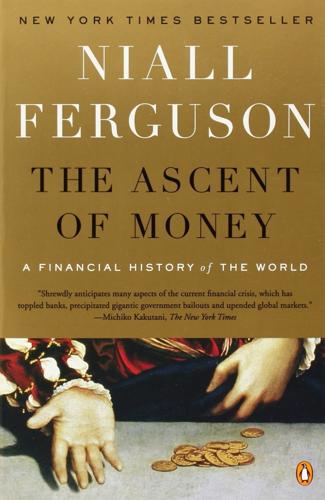
The Ascent of Money: A Financial History of the World
by
Niall Ferguson
Published 13 Nov 2007
The game we know today as Monopoly was first devised in 1903 by an American woman, Elizabeth (‘Lizzie’) Phillips, a devotee of the radical economist Henry George. Her Utopian dream was of a world in which the only tax would be a levy on land values. The game’s intended purpose was to expose the iniquity of a social system in which a small minority of landlords profited from the rents they collected from tenants. Originally known as The Landlord’s Game, this proto-Monopoly had a number of familiar features - the continuous rectangular path, the Go to Jail corner - but it appeared too complex and didactic to have mass appeal. Indeed, its early adopters included a couple of eccentric university professors, Scott Nearing at Wharton and Guy Tugwell at Columbia, who modified it for classroom use.
…
Darrow was good with his hands (he could turn out a single game in eight hours), but he also had the salesman’s ‘moxie’, persuading the Philadelphia department store John Wanamaker and the toy retailer F. A. O. Schwartz to buy his game for the 1934 Christmas season. Soon he was selling more than he could make by himself. In 1935 the board-games company Parker Brothers (which had passed on the earlier Landlord’s Game) bought him out.1 The Great Depression might have seemed an unpropitious time to launch what had by now mutated into a game for would-be property owners. But perhaps all that fake multicoloured money was part of Monopoly’s appeal. ‘As the name of the game suggests, ’ announced Parker Brothers in April 1935: the players deal in real estate, railroads and public utilities in an endeavor to obtain a monopoly on a piece of property so as to obtain rent from the other players.
…
Kenya 280 Keynes, John Maynard/ Keynesianism 58 on inflation 106 Keynesian policies 112 on uncertainty 343-4 Klein, Naomi 182 Knight, Frank 343 Kondo, Bunji 206 Krugman, Paul 312 Kuwait Investment Authority 337n. Kyoto 206 labour: in Asia 287 forced 19 mobility 14 money as chains of 1 organized see trade unions rural 288 as unit of value 18-19 unskilled and semi-skilled 14 Labour party 251-2 Lackey, Judge 181-2n. Lamarckian evolution 351 Lamont, Norman 318 Landlord’s Game 230-31 landlords, negative views of 230 Lasswell, Harold D. 207 Latin America: aid to 307 British investment in 293 debt crises and currency depreciations 88. Latin America - cont. Enron and 171 pensions 219 poverty rates 218 see also South America Latino borrowers 266 Law of Ann 191 law, finance and 37. see also regulation Law, Gerard 39-41 Law, John 126-7 absolutism 140 and banks see banks and paper money 138-9 and pensions 146 Lay, Kenneth 169-74 Leeson, Nick 288 Left wing 89 see also Labour party; socialists Lelystad 135 le Maire, Isaac 131 lending see banks; debt; loans; moneylenders Lenin, V.
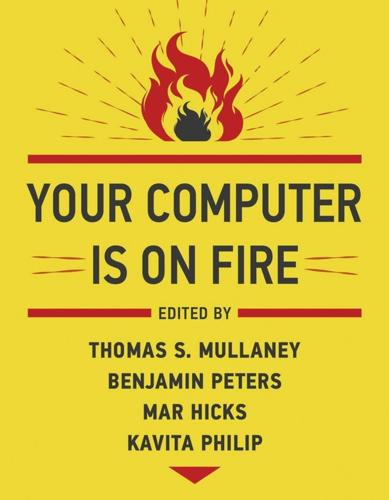
Your Computer Is on Fire
by
Thomas S. Mullaney
,
Benjamin Peters
,
Mar Hicks
and
Kavita Philip
Published 9 Mar 2021
The result is that they must mortgage some of their properties or trade them away, reducing their opportunities to collect rent. Randomness becomes all—the positive feedback makes it likely that a player in the lead will win, but it plays out slowly and unpredictably as the rolls of the die determine who loses resources and who collects them. And this is the point. Monopoly is based on The Landlord’s Game, which was created at the turn of the twentieth century as “a practical demonstration of the present system of land-grabbing with all its usual outcomes and consequences,” as characterized by its designer, Elizabeth Magie.22 The best-known version of Magie’s story is told by Mary Pilon in her book, The Monopolists.
…
This is not to say that we can’t imagine a version of The Sims that actually captured the bittersweet experience of the passage of time in an extended network of family and friends. But this would need to be a game in which the foundations of the playable model were made up of things like histories and emotions, rather than resources. Similarly, if we were to imagine a game about philosophical issues that are less economically focused than those in The Landlord’s Game, its playable model would need a foundation other than resources. Which brings us to the question of whether it is possible to make such games, and why. Operational Logics The foundation of any playable model is a set of operational logics.26 For example, the primary foundation of Monopoly is its resource logics, though a pattern-matching logic determines which properties can be further developed.
…
See also Chinese keyboard; QWERTY keyboard depression, 236, 340–341, 346, 348–349 efficiency, 337–338, 344 Japanese, 216 MingKwai, 346–349, 347f, 353 not the interface, 350–356 Keystroke, 219, 346, 348–349 Keyword, 57 Khalil, Seyed, 218, 220 Khan, Salman, 302 Khmer (language), 343 Khrushchev, Nikita, 76, 78 Kickstarter, 23 Kitov, Anatoly, 76–77 Klein, Freada Kapor, 259–260, 265 Klonick, Kate, 61, 63 Korea (Korean), 7, 208, 341–344, 350–351, 354, 357 Hangul, 7, 341–344, 351 speech technology, 188, 189t Koster, Ralph, 233–234 Kosygin, Aleksei, 79 Kreative Arts, 299 Labor Christian, 161, 170–171 invisibility, 6, 169, 308–309 and women, 202–203 new types and categories, 39 not headed toward automation, 121–122 Lakhdar, Mohammed, 219 Landlord’s Game, The, 240, 242 Larson, Quincy, 258 Latin America, 79, 91, 96, 104, 300 Latinx, 199, 205, 253, 255, 257, 260, 266 Law for the Protection of Mothers and Children, 169 Layoff, 235–236, 244 “Lean in,” 136–137 Leary, Mary Graw, 61 Lebanon, 219 Lee, Sedol, 7 Legend of Zelda, The, 243 Leonie, Susie, 327 Lessig, Lawrence, 289 Levine, Ken, 237–238 LGBTQIA, 154, 160 Licklider, J.C.R., 83 Lien-Sheng, Yang, 349 Lin, Yutang, 346–348, 350 Logic of opacity, 63 Low-income, 205, 257, 298, 329 Low-level language, 275, 277, 281 Lyon, Barrett, 107, 108f, 110 Mac, 225 Microsoft Office, 223–224 Mac (cont.)
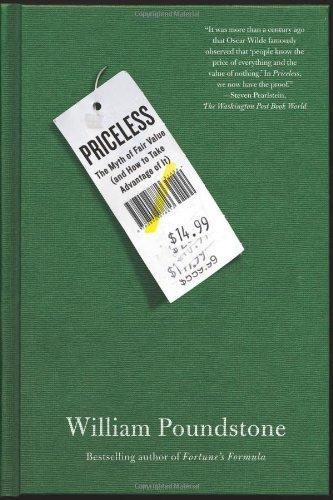
Priceless: The Myth of Fair Value (And How to Take Advantage of It)
by
William Poundstone
Published 1 Jan 2010
He did not actually invent the game but appropriated someone else’s idea. Monopoly is an allegory of free-market capitalism, and whether it’s for it or against it is never made clear. Though it glorifies profit, the word “monopoly” has always been pejorative. One of the game’s precursors, “The Landlord’s Game,” had an overtly socialist theme. Monopoly has succeeded because it is so effective at creating an immersive, internally self-consistent world. Players forget whatever is in their wallets and use “Monopoly money,” a term that has come to be a metaphor for the unreality of price decisions. The prices in Monopoly make no sense ($100 houses), but the ratios of prices tell the player all he needs to know.
…
Crew clothing company, 190, 203, 205 Jensen, Keith, 123–24 Jensen, Marlene, 232 JetBlue Airlines, 182, 183 Jews: Israeli, 81–82; mobsters, 49; Nazi persecution of, 83–84 Jobs, Steve, 184, 257 Johns Hopkins University, 52 Johnson, Eric, 280–82 Johnson & Johnson, 6 Jopling, Jay, 267 Journal of Business, 110 Journal of Consumer Research, 153, 280 Journal of Experimental Psychology, The, 65 juries, 197; damages awarded by, 3–4, 17–21, 276–79 Kahn, Irah, 84 Kahneman, Daniel, 16, 83–87, 105, 133, 146, 147, 188, 196, 236; on altruism, 117; on anchoring, 144, 207; economists’ hostility to, 77; fairness research of, 106–107, 110, 112–14; heuristics of, 88–89, 125–28, 197; on jury awards, 19, 276–77, 279; at Oregon Research Institute, 28, 87–88; on priming, 92, 94, 286; prospect theory of, 97–99, 101–102, 104, 132; and stock market bubbles, 261; on ultimatum game, 113, 115; United Nations experiment of, 10–12, 90 Kalmar, Tepper, 160, 161 Kelley Blue Book, 75 Kelly, Walt, 76 Kennedy, Edward, 257 Kenya, 122 Klein, Calvin, 246 Knetsch, Jack, 105, 107, 110, 113–14, 117 Kohl, Helmut, 271 Koolhaas, Rem, 158 Kouri, Elena, 250 Kozlowski, Dennis, 234–36 Kozlowski, Karen, 234 Krueger, Alan, 165–66 Kucher, Eckhard, 148–49 Lacayo, Richard, 267 Lagavulin whiskey, 219 laissez-faire capitalism, 108 Lamelera people, 123 “Landlord’s Game, The,” 284 La Rue, Diane, 167 Las Vegas Review Journal, 71 Laube, Jim, 160 laundry detergent, 180 Lauren, Ralph, 155 lawsuits, jury awards in, 3–4, 17–21, 276–79 Leaves of Grass (Whitman), 194 Lee, Bob, 144 Leeds, University of, 219 Leeuwenhoek, Anton von, 208 Lehman Brothers, 268 Leipzig, University of, 30 Lichtenstein, Donald, 204–206 Lichtenstein, Sarah, 10, 28, 53, 62–77, 79, 81, 82, 87, 90, 220 Liebeck v.
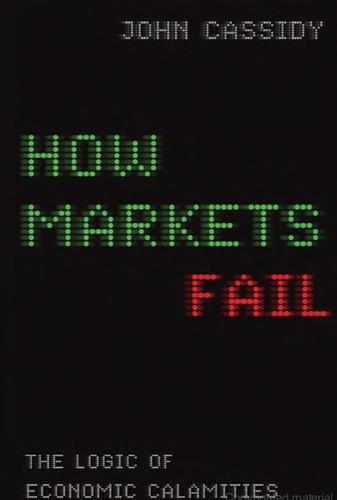
How Markets Fail: The Logic of Economic Calamities
by
John Cassidy
Published 10 Nov 2009
Many people are introduced to the subject as children when they play the popular board game of the same name, the object of which is to buy up as many properties as possible and charge your opponents exorbitant rents. Parker Brothers, a unit of Hasbro, has marketed Monopoly since the 1930s, but the game’s origins can be traced back to the Landlord’s Game, which Lizzie Magie, a young Quaker woman from Virginia, invented in 1904 to demonstrate the evils of private land monopolies. Around the turn of the twentieth century, there was also a great deal of public concern about the formation of vast commercial monopolies, known as “trusts,” which had come to dominate many industries, such as sugar, tobacco, railroads, and beer.
…
Kuwait Kyoto Protocol Labor Statistics, Bureau of Labour Party, British Laffer, Arthur Lagrange, Joseph-Louis Lahart, Justin Laibson, David laissez-faire of Friedman general equilibrium theory and Greenspan and of Hayek middle ground between collectivism and of Mill Landlord’s Game, The Lange, Oskar Lausanne, University of “Law and Economics” school Lay, Kenneth Learned Hand, Billings Leeson, Nick Lehman Brothers collapse of compensation of CEO of subprime mortgage securities issued by Lehn, Kenneth Lenin, Vladimir Leontief, Wassily Lerner, Abba Levittown (New York) Lewis, Kenneth Liberal Party, British Liebniz, Gottfried Loan Performance Locke, John Loewenstein, George Lombard Street (Bagehot) London interbank offered rate (LIBO) London School of Economics (LSE) Long Beach Mortgage Company Long-Term Capital Management (LCTM) Lucas, Robert Lucent Technologies Luftwaffe Macaulay, Thomas Babington Mack, John J.
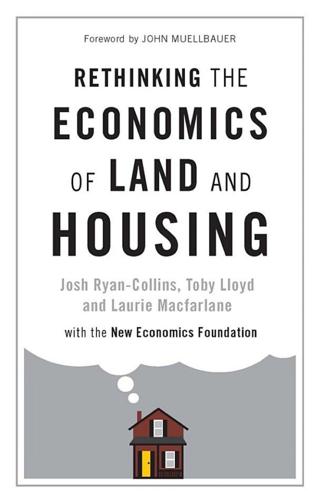
Rethinking the Economics of Land and Housing
by
Josh Ryan-Collins
,
Toby Lloyd
and
Laurie Macfarlane
Published 28 Feb 2017
Act (1919) (the Addison Act), 78 housing quality, 97 housing supply, effect of residual valuation methodology, 98 housing tenure: European regulations, 32; housing costs by tenure, 179; leasehold-freehold, 213; reform proposals, 212–15; restricted sale tenures, 213–14; reversionary tenures, 214; trends, 82, 83, 106–7, 107; see also private rented sector housing wealth: age distribution, 181–2, 181; consumption-to-income ratio trends, 143–4, 144; increase, 158–9, 170; and increase in wealth-to-income ratio, 172–3; net property wealth distribution, 174–5, 174, 175, 176; and wealth inequality, 174–9 Howard, Sir Ebenezer, 75–6 human rights, 23 imputed rental income: Switzerland, 157; UK tax-exemption, 85, 104–5 income: consumption-to-income ratio trends, 143–4, 144; disposable income to house price ratio, 112–14, 114; effects of increased income, 9, 64 income inequality, 162–3 income tax, 69, 168–9 Industrial Revolution, 68–9 inequality: causes and consequences, 165–9; and excessive economic rent, 43; and financial instability, 185–7; Gini coefficient measures, 163, 177, 178; health and social problems, 185; and homeownership, 92; and house prices, 177–8; and housing costs, 179–80; income inequality, 162–3; and inheritance, 182; and land value, 46, 173, 190; and landownership, 26–7; and mortgage debt, 116; property and the state, 17–18; regional inequality, 165, 182–3; and taxation, 168–9; wealth inequality, 163–4, 174–9 infrastructure projects: compulsory land purchase, 31, 73, 196–7, 222; and land value, 6, 42, 194–5 inheritance, 19, 127, 182 inheritance tax (IHT), 104–5, 169, 202 Institute of New Economic Thinking, 218n11 iron and steel industry, 69 James II, King, 66, 80 Japan: credit window guidance, 207; credit-driven bubbles, 111; financial crash, 151–3; house price to income ratio, 112, 114; land prices, 32; mortgage market structure, 157; size of new-builds, 97 Jefferson, Thomas, 22, 26 Jubilee Line, 194–5 Keynes, John Maynard, 84 Keynesianism, 83, 84, 152 King, Mervyn, 154 Korean Land Corporation, 196 labour markets, and homeownership, 27–8 labour productivity, 165–7 land: changing economic role, 190; as collateral, 7, 20–1, 55, 127–8, 160; conflated with capital, 48–52; definition, 38; differences between land and capital, 52–7; and economic rent, 39–44, 56–7; factor of production, 37–8; financialisation, 14, 110–12; historical uses, 3–4; immobile and fixed nature, 55; limited supply, 4, 63; permanent and timeless space, 52–4; state acquisition, 30–1 Land Bank of Britain proposal, 196 land development taxes, 35 land pooling, 197–8 land prices: agricultural, 122–3; effect of financial crisis, 101; land banks (current and strategic), 96–7, 101; and planning regulations, 32; volatility, 8, 8; see also land value Land Registry, 63 land rights, US native population, 26 land taxes: and economic rent, 34–5, 45–8, 76–7, 199, 222; opposition, 57–8, 60, 77; political barriers, 35; theoretical advantages, 34–5; see also land value tax (LVT) land title, 21, 31, 36 land value: asset for the future, 6–7; determined by current use, 6; effect on capital of rising costs, 56; factors outside owner’s control, 55–6; increase over time, 53–4; and inequality, 46, 173, 190; lack of reliable public dataset, 63–4, 219; location and infrastructure, 6; residual valuation methodology, 98–9; site value vs market value, 202; state interventions, 30; uplift created by planning permission, 79–80, 216; use value vs market value, 110; see also land prices land value tax (LVT): Australia, 204–5; Denmark, 204; economic case for reform, 199–201; Henry George’s single tax movement, 46–8, 57–8; Mirlees Review recommendation, 199–200; People’s Budget proposal (1909), 48n9, 76–7; practical and political challenges, 201–5; split rate taxation, 204–5 land-credit feedback cycle, 8, 114–19, 190–1, 222 landlords: taxation, 85; see also buy-to-let (BTL); private rented sector ‘The Landlord’s Game’, 47 landownership: benefits of public ownership, 193–6; and economic rent, 10–13; ‘high income-elasticity of demand’, 9; and inequality, 26–7; land pooling, 197–8; modern economic theories, 16–18; moral qualities, 22; multiple forms, 18–20; and political power, 22–3; and social status, 20; as theft, 22–5, 43, 189; see also property ownership Lassalle, Ferdinand, 43 leasehold-freehold tenure, 213 leases, lifetime leases, 74 legacy landowners, 197–8 Lenin, Vladimir, 43 Letchworth Garden City, 75 Letchworth Heritage Foundation, 75 leverage, 184 liberal economics see classical economics lifecycle model, 124–8, 159 living conditions, 70–1 Lloyd George, David, 48, 76, 78 Lloyds TSB, 139 loan-to-value (LTV) ratios, 139, 156, 157 location, 6, 40–3 Locke, John, 16–18, 26 London: Bishops’ Avenue, 109; Boundary Estate, 73; Jubilee Line, 194–5; Old Nichol, 73; private rented sector, 223; St Clements Community Land Trust, 214 mainstream economics see neoclassical economics Malthus, Thomas, 40 manufacturing industry, 168 marginal productivity theory, 49–50, 51, 56, 57–9, 165–7 Marshall, Alfred, 55 Marx, Karl, 18, 43, 59, 61 mercantilism, 38, 70 microeconomics, 34, 51, 53 Mill, John Stuart, 25, 45, 199 Milton Keynes, 88 Minsky, Hyman, 152–3, 155 MIRAS (mortgage interest relief at source), 86 Mirrlees Review, 199–200 monetarism, 86, 87 Monopoly, 47 mortgage lending: affordability pressures, 100; bad debt, 140; bank funding arrangements, 131; as credit creation, 114; debt-to-income ratio, 115–16, 116, 139, 159, 186; default rates, 141; deregulation, 88, 132–5, 178; financial crisis collapse, 139–40; full recourse vs non-recourse loans, 141–2; house price-credit feedback cycle, 119–24; importance in banks’ lending portfolios, 61, 119; interest rates for landlords, 77; lifecycle model, 124–8, 159; loan-to-income limits, 155; loan-to-value (LTV) ratios, 139, 156, 157; mortgage debt-to-GDP ratio, 156–8, 156; mortgage interest relief at source (MIRAS), 86; reform proposals, 211–12; residential mortgage-backed securities (RMBS), 137–9, 140, 160; tax relief, 133; trends, 107; see also buy-to-let (BTL) Muellbauer, John, 110 mutual co-ownership, 86 Napoleonic Wars, 69 national accounts, lack of land value information, 63–4, 219 national income: wealth to national income ratio, 171–4, 171, 172; see also GDP nationalisation, 43 natural law, 25–6 natural property rights theory, 16–18 negative equity, 123, 133–4 neoclassical economics, 5, 17, 27, 48–9, 50, 52, 57, 111, 192 Netherlands, land pooling, 198 New Keynesianism, 125n6 New Towns programme, 66, 71, 80–1, 88, 184, 197 new-build homes, 97 NIMBYism, 24 Northern Rock, 136–7 Nozick, Robert, 26 OECD, 64, 219, 220 Office for National Statistics, Blue Book, 219 oil sector, 44 OPEC (Organization of the Petroleum Exporting Countries), 44 orthodox economics see neoclassical economics Oswald, Andrew J., 27 overseas investment, 100, 122, 149, 160, 183 Owen, Robert, 71 Paine, Thomas, 25 Pareto efficiency, 166n1 patents, 44 Peabody, George, 71 Peel, Robert, 43 Pennsylvania, split rate taxation, 205 Phillips, Elizabeth J.
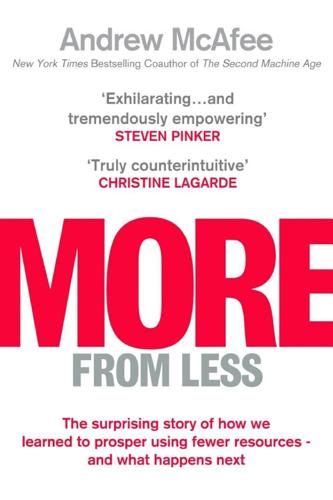
More From Less: The Surprising Story of How We Learned to Prosper Using Fewer Resources – and What Happens Next
by
Andrew McAfee
Published 30 Sep 2019
They also tend to innovate less, again because no rivals exist to take away their market by offering a better product. Because of their effect on prices and innovation, monopolies have long been opposed both by professional economists and many consumers. The American board game Monopoly traces its roots to 1903, when the Landlord’s Game was invented by Elizabeth Magie to illustrate the problems of concentrating land ownership. The game eventually became quite popular. It was played frequently and earnestly during the 1970s by a group of students at the University of Chicago. When one asked the free-market-loving (and Nobel Prize–winning) economist Milton Friedman to sign the player’s Monopoly set, Friedman obliged, but also wrote “down with” before the game’s title.
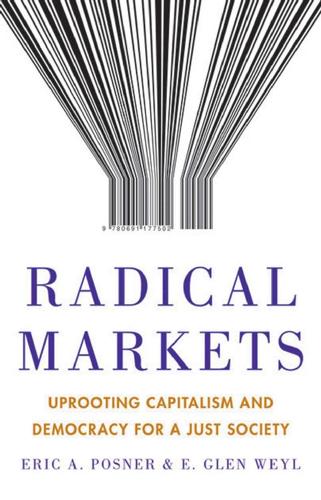
Radical Markets: Uprooting Capitalism and Democracy for a Just Society
by
Eric Posner
and
E. Weyl
Published 14 May 2018
Millions of acres, where others are now shut out by high prices, would be abandoned or sold at trivial prices.”16 If the government imposes a tax on ownership of land, then people who can use their land productively will do so and be able to pay the tax, while those who would otherwise be happy to let it sit vacant will sell the land in order to avoid the tax. George’s proposals quickly captured the public imagination (see figure 1.1). Monopoly, perhaps the most popular board game ever, was originally titled The Landlord’s Game. Elizabeth Magie designed it in 1904 as a way to educate the public about George’s ideas. According to the rules we are now familiar with, each player tries to monopolize properties in order to bankrupt the other players and drive them out of the game. However, the original game (which one can purchase from Folkopoly Press on eBay) had different rules under which a tax on land rents (though not on the houses built upon them) funds public works, giving players free access to the utilities and railroads, and paying out a social dividend that augments the wages earned when passing what is now called “Go.”17 These rules make domination by one player impossible and ensure that as every player develops her properties, all players benefit.
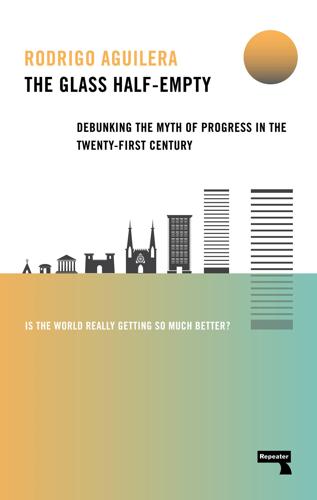
The Glass Half-Empty: Debunking the Myth of Progress in the Twenty-First Century
by
Rodrigo Aguilera
Published 10 Mar 2020
This was the age in which the final shackles of mercantilism had been cast off and the engines of capitalism finally began to roar. Monopoly’s origins, however, are nothing like the game we know now where players compete to monopolize the real estate market. In fact, Monopoly was originally called The Landlord’s Game and was the brainchild of writer and inventor Elizabeth Magie, who hoped to use the game to teach the virtues of Georgism, an economic philosophy developed by US economist and reformer Henry George that was highly popular at the time. In particular, the game was meant to highlight the benefits of a single tax on land rent which Georgists believed was a superior alternative to taxes on labor.